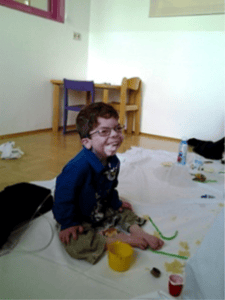7 Lessons I’ve Learned From Having a Child With a Feeding Tube
Over the days, weeks, months and years of having a tube-fed child, I have learnt a lot, and not just as a consequence of him being tube-fed for over five years. A lot of these lessons are generally applicable but maybe tube feeding sometimes makes certain lessons stand out more.
1. Expect the unexpected
A feeding tube often brings other problems with it. This can be anything from finding suitable clothing to dealing with severe reflux and vomiting after tube feeds while out and about. On the one hand you learn to (usually) calmly deal with all kinds of situations that would have previously completely flustered you. On the other hand, you don’t go anywhere without having a spare set of everything in case of any conceivable emergency.
2. Doctors are not Gods in white coats
After dealing with a lot of doctors and specialists, I have come to realize that medical training does not necessarily make you an expert. In fact the best doctors are those that openly admit their own limitations to their knowledge – and then go find out more.
Therefore a gastroenterologist is not necessarily an expert on tube weaning, similarly a tube feeding team, while providing feeding tube guidelines, is also not necessarily expert on tube weaning either.
Learn to question, demand answers and to not be intimidated by a medical qualification.
3. New vocabulary
Every parent of a medically fragile child has to learn a whole new vocabulary to cover their own child’s medical history. The parent of a heart child may talk a different language to the parent of a premature child.
Parents dealing with a feeding tube will learn a new vocabulary and become fluent in a language that includes the different types of tube, and even new terms such as tube dependency and feeding disorders in early childhood. Most people don’t know that such terms or medical conditions exist – and many doctors don’t know these terms either.
4. It’s about more than just about food or hunger
Well-meant advice on getting your child to eat normally includes such statements as ‘Sit down to eat as a family.’, ‘He’ll copy you, if he sees you eating.’, ‘Have you tried giving him anything in his mouth?’, ‘What about food x or y, they are really tasty.’ You develop a thick skin, an outward smile and pat reply to such suggestions, because, let’s face it, you’ve tried everything already. Parents are not stupid.
But tube feeding and weaning is more than about hunger, food and types of food. It is a psychological and comprehensive process that addresses more than just hunger equals food.
Once weaned, people quickly forget the earlier troubles and start urging you to only feed your child healthy foods. Meanwhile you sit there for years after the tube weaning still wondering and appreciating every time your child says it is hungry, eats anything or gets in a mess. Whether it is fast food or a healthy superfood doesn’t matter, what matters is that your child EATS! And enjoys it.
In fact a lot of tube weaned kids joyfully eat a wider variety of foods than their non-tubie friends and siblings.
5. Trust your instinct and trust your child
Possibly one of the greatest lessons for any parent is to trust their own instincts when it comes to their child and in turn to trust their child. Parents are faced with a barrage of information on how to be a perfect parent and most of the information is conflicting. Then we are faced with medical advice, family advice, feeding tube guidelines… but only the parent truly knows their child.
All too often a parent’s concerns are ignored or overruled as being „only the parent“. However only the parent spends the greatest amount of time and care with their child. Trust your instincts and don’t be afraid to advocate for your family and your child.
6. It’s a child not a medical history
Tube weaning and eventually removing the feeding tube allowed me to be a parent rather than a constant care-giver, and to see my child rather than a constant medical history. Gone are the continual weight checks and calorie counting, together with the tube dependency, and a slice of normalcy was welcomed into our lives.
I assess my child now in terms of his general health and wellbeing – does he have energy? Is he in a good mood?
7. The power of hope and belief
The final and most powerful lesson that any medically fragile or challenged child will teach you is to question what is truly important in life: that hope and belief are incredibly powerful tools for life and in helping others to achieve their potential.
Before our tube wean, my child was assessed by a group of professionals (not NoTube) as being unable to understand the connection between food and hunger or of understanding anything. I knew this assessment to be wrong and always believed that with the right help he would no longer be tube dependent.
When we successfully completed the tube weaning with NoTube, I realized that the greatest difference the weaning had made to me and our lives, was that they unconditionally believed in me and my instincts and ability as a parent. They took the fragments of hope and belief I had in my child, and in turn believed in me and strengthened me.
Our children will have already beaten many medical statistics in their lives. Our hope and belief in them helped them through and will continue into the future. If you ever want to make the world a better place then offer someone, even a stranger, your unconditional hope and belief in them. It can be a life-changer.

